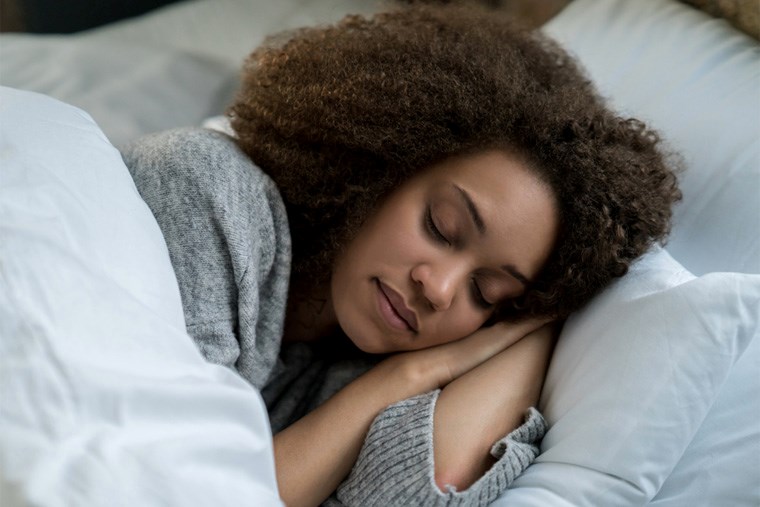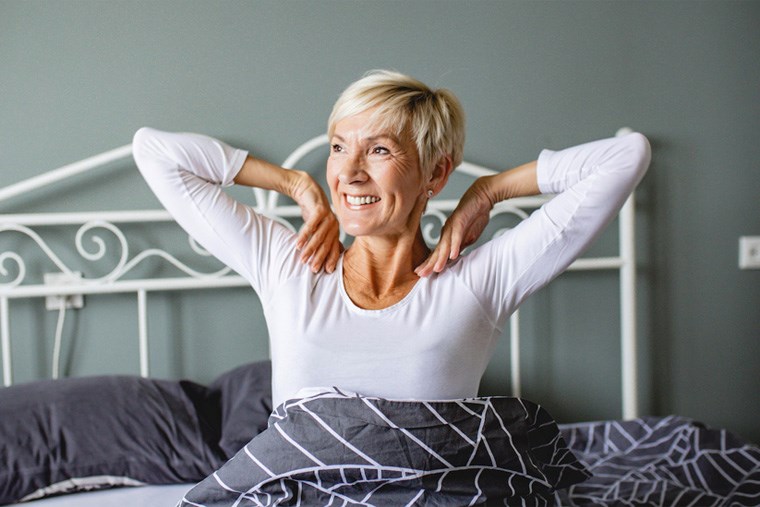Getting a good night’s sleep plays a vital role in your overall health. Sleeping recharges your body and brain to help prepare and energize you for each new day. On the other hand, sleep deprivation can cause a slew of problems, including memory issues and an increased risk for car accidents.
On average, adults aged 26-64 need seven to nine hours of sleep each night, and those 65 and older need seven to eight hours. Unfortunately, many people don’t get proper rest. If persistent insomnia keeps you up all night and feels exhausting each morning, follow these tips to fall asleep faster and stay asleep longer.
Stick to a Consistent Bedtime
Your internal circadian rhythm regulates many bodily functions like mood, body temperature, hunger, digestion, sleeping, and waking. Nodding off at different, irregular hours upsets this natural rhythm. To keep your internal clock in balance, set and stick to a consistent bedtime each night. Keeping a regular schedule helps your brain naturally start to wind down before it’s time to go to sleep, enabling you to fall asleep and get better rest.
Follow a Pre-Bedtime Routine
An easy way to transition from a busy day to a peaceful night of rest is to follow a pre-bedtime routine. You can start preparing to snooze as early as two hours or as soon as 30 minutes before your designated bedtime. Whatever steps you decide to take, set an alarm to begin physically and mentally winding down at the same time each night. To optimize sleep, try not to deviate from the schedule.
Cut Caffeine Around Midday
You’re not alone if you need a caffeine boost to kickstart the day - but the last thing you want to do is chug a soda or a cup of coffee right before you attempt to go to sleep. The caffeine in these enjoyable drinks stimulates your brain. To avoid staying wired and awake at night, stop caffeine intake at midday or right after lunch.
Eat Foods That Promote Better Sleep
What you eat not only impacts your overall health but also affects the duration and quality of your sleep. For example, everyone feels sleepy after eating Thanksgiving turkey, right? That’s because the popular source of protein contains an amino acid called tryptophan – along with chicken, fish, and some dairy products like milk and low-fat cheese. Ingesting tryptophan-bearing foods before bed can make you tired.
Other sleep-friendly foods include tart cherries and tart cherry juice. They both contain melatonin – which is a hormone that controls your sleep-wake cycle. Certain carbs like white bread and pasta also promote sleep, along with serotonin-rich dark chocolate, bananas, rice, kiwi, nuts, and fatty fish.
Finally, to stave off uncomfortable sleep disruptors like acid reflux, limit alcoholic beverages, and don’t eat spicy foods less than three hours before bedtime. Remember to always seek medical advice before making any dietary changes.
 andresr via gettyimages.com
andresr via gettyimages.comKeep Your Sleep Space Dark and Cool
Being too hot or bathed in the light will keep you awake. Dial down the thermostat and cover windows with heavy curtains or shades to create a dark, cool sleep haven. You can also take a lukewarm shower to cool down and relax before climbing into bed.
Turn Off Devices
So many of us are tethered to smartphones, tablets, TVs, and other electronic devices. To get to sleep faster, don’t use any of these in the bedroom – especially after the bedtime routine alarm sounds. In general, turn off and tune out devices to make sure your sleeping quarters are a quiet, relaxing oasis.
Embrace Sleep Assistive Technology
If you can’t sleep, why not let Matthew McConaughey help you drift off to dreamland by telling you stories on mindfulness apps like Calm. The Sleep Melodies and lots of other popular apps play ambient sounds to lull you to sleep. Alexa or Google Assistant will also play soothing sounds like rain, rolling waves, a snowstorm, and more at your command.
Read, Meditate, or Write in Your Journal
Reading, meditating, or writing in a journal are quiet bedtime activities that can help you relax, reflect, and reduce stress so you can get some rest. Once your body is used to this routine every night, it’ll start to wind down on its own.
Overall, incorporating these suggestions into your nightly routine can help you sleep better and longer!
 This story was made possible by our Community Partners Program. Thank you Didsbury Dental for helping to expand local news coverage in Alberta. Learn more.
This story was made possible by our Community Partners Program. Thank you Didsbury Dental for helping to expand local news coverage in Alberta. Learn more.


